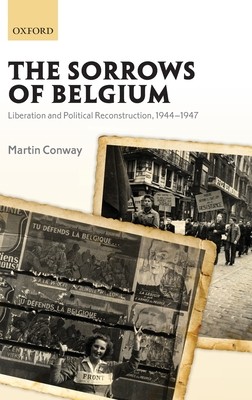
- We will send in 10–14 business days.
- Author: Martin Conway
- Publisher: Oxford University Press, USA
- ISBN-10: 0199694346
- ISBN-13: 9780199694341
- Format: 15.2 x 23.6 x 3.1 cm, hardcover
- Language: English
- SAVE -10% with code: EXTRA
Reviews
Description
The liberation of Belgium by Allied troops in September 1944 marked the end of a harsh German Occupation, but also the beginning of a turbulent and decisive period in the history of the country. There would be no easy transition to peace. Instead, the rival political forces of King Leopold III and his supporters, the former government in exile in London, and the Resistance movements which had emerged during the Occupation confronted each other in a bitter struggle for political ascendancy. The subsequent few years were dominated by an almost continual air of political and social crisis as Resistance demonstrations, strikes, and protests for and against the King appeared to threaten civil war and the institutional dissolution of the country. And yet by 1947 a certain stability had been achieved: the Resistance groups had been marginalised, the Communist Party was excluded from government, the King languished in unwilling exile in Switzerland, and, most tangibly, the pre-war
political parties and the parliamentary political regime had been restored.
EXTRA 10 % discount with code: EXTRA
The promotion ends in 19d.01:10:04
The discount code is valid when purchasing from 10 €. Discounts do not stack.
- Author: Martin Conway
- Publisher: Oxford University Press, USA
- ISBN-10: 0199694346
- ISBN-13: 9780199694341
- Format: 15.2 x 23.6 x 3.1 cm, hardcover
- Language: English English
The liberation of Belgium by Allied troops in September 1944 marked the end of a harsh German Occupation, but also the beginning of a turbulent and decisive period in the history of the country. There would be no easy transition to peace. Instead, the rival political forces of King Leopold III and his supporters, the former government in exile in London, and the Resistance movements which had emerged during the Occupation confronted each other in a bitter struggle for political ascendancy. The subsequent few years were dominated by an almost continual air of political and social crisis as Resistance demonstrations, strikes, and protests for and against the King appeared to threaten civil war and the institutional dissolution of the country. And yet by 1947 a certain stability had been achieved: the Resistance groups had been marginalised, the Communist Party was excluded from government, the King languished in unwilling exile in Switzerland, and, most tangibly, the pre-war
political parties and the parliamentary political regime had been restored.


Reviews